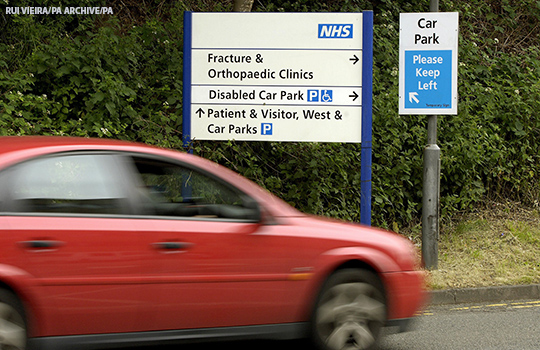
Focusing on free car parking as a way to “reward” hospital staff is neither equitable, nor beneficial to health and wellbeing, say Harriet Larrington-Spencer and Matthew Jackson
Last month The Mail on Sunday reported that King’s College London Hospital Trust planned to increase the cost of annual parking permits by 200%. Although the implementation of this price rise has since been deferred, this article is the latest chapter in an ongoing debate about hospital parking charges, including Labour pledging to end hospital parking fees and the announcement of free parking for NHS staff during the covid-19 pandemic.
The centrality of parking to hospital care is the result of car-centric transport policy and urban planning, which has seen the consolidation of hospital services into larger units with wider catchments, often in areas that are difficult to access without a car. Accessibility is about more than “getting there” without a car; it also encompasses getting somewhere within a reasonable time, cost, and ease, and safely. To illustrate what this means in practice, a recent study found that 66% of elderly people are unable to reach a hospital within 30 minutes by public transport.
Popular reactions to rising hospital parking charges have centralised the financial hardship that parking fees inflict upon healthcare workers who, due to unsociable working hours and inaccessible (using the above definition) public transport, rely upon private vehicles. Yet we’d argue that the real injustice is experienced by hospital staff who cannot afford a car or cannot drive for reasons of health or disability and low income hospital workers who experience forced car ownership. The former must rely on travel options that are made less than ideal by our car-centric planning processes, while their colleagues receive subsidies through parking. The latter group experience significant financial burden as a result of having to own a car to access hospitals as workplaces.
Research shows that for low income groups, the costs of owning, maintaining, and running a car often results in deprivation in other areas of their lives—such as fuel poverty, food poverty, and participation in social activities. Considering the existing financial precarities among low income health professionals (NHS staff are top of the list in accessing payday loans), forced car ownership is an additional financial burden.
Public objections to the cost of hospital car parking also don’t account for the environmental consequences of private vehicle commuting and its wider public health implications. Car and taxi traffic on UK roads is growing annually, and road transport contributes one fifth of greenhouse gas emissions in the UK, with climate change expected to have extensive detrimental health outcomes. Air pollution is the biggest environmental health risk across Europe, with attributable deaths including heart disease, stroke, lung diseases, and lung cancer. UK research also suggests an association between traffic related air pollution and the number of adult cardiovascular and paediatric respiratory hospital admissions.
The pressure of private vehicle use on hospitals can be directly observed: firstly, through onsite parking becoming a scarce resource and the associated frustrations of locating a parking space, and the encroachment of car parking on to residential streets (see Bradford and Preston), and, secondly, that many UK hospitals are in areas which exceed safe and legal limits of fine particulate matter (PM2.5).
Underlying popular reactions to charges for hospital parking is the idea that free or cheap parking for NHS staff is a reward for sacrifice. When the government announced free parking for NHS staff working in hospitals during the first wave of the covid-19 pandemic, it was because staff were “going above and beyond every day.” This is problematic on many levels. Using free or cheap parking to (inequitably) reward NHS staff applauds the notion that the everyday running of NHS hospitals should be achieved through the sacrifice(ing) of staff. It also reinforces the unsustainable increase in private car use and the associated negative environmental and physical health sequelae. Subsidised parking removes the natural market drivers that should force alternative solutions to be explored.
A new paradigm is needed. We should work towards a health service where those who care are also cared for, while simultaneously modelling healthy, environmentally friendly behaviours. Free staff parking is not caring. It creates poverty through forced car ownership, it stresses hospital parking facilities that are already at capacity, and it promotes polluting behaviour—with the ensuing economic and health consequences.
A caring health system would place staff and patient health and wellbeing at the centre of policy decisions and promote improved public transport and active travel options as a way to achieve this, while also contributing to wider environmental and public health benefits.
The challenge, then, is how to make sustainable forms of travel feasible for all hospital workers. We propose that some starting points would be to work with local councils to ensure hospitals become local hubs for public and active transport; discount public transport instead of subsidising car parking; introduce means tested parking permits, with increased parking charges for shorter commutes; and expand onsite changing rooms and cycle storage.
The NHS of the future must work with local authorities, public transport providers, patients, and staff to develop a diverse range of pragmatic, economic, and accessible transport options to hospital sites.
Harriet Larrington-Spencer, research associate, Healthy Active Cities, University of Salford. Twitter @harrielspencer
Matthew Jackson, consultant in anaesthesia and intensive care medicine, Deputy CD Critical Care, Stockport NHS Foundation Trust. Twitter @doc_matt_jacko
Competing interests: None declared.
"caring" - Google News
December 08, 2020 at 07:16PM
https://ift.tt/39RQsmd
Caring for those who care—free parking is not it - The BMJ - The BMJ
"caring" - Google News
https://ift.tt/2z0ngcp
https://ift.tt/3fgQ2Gv
Bagikan Berita Ini














0 Response to "Caring for those who care—free parking is not it - The BMJ - The BMJ"
Post a Comment